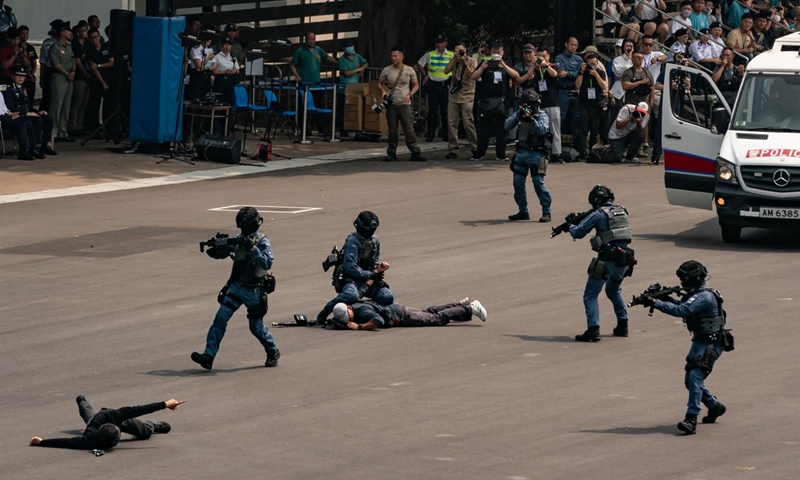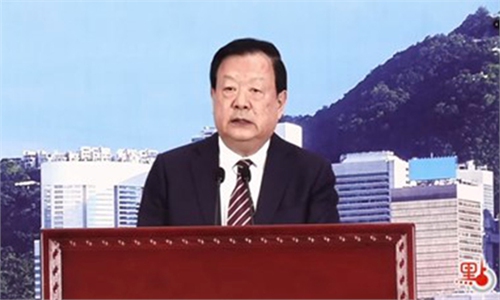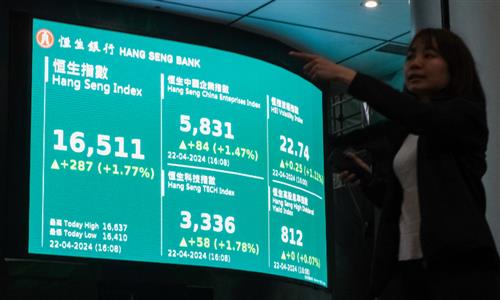HK's counter-terrorism hotline receives over 28,000 messages, with 13% being further investigated

During the open day at the Hong Kong Police College, the police conducted a counter-terrorism drill on April 15, 2023. That day was also the National Security Education Day for local residents. Photo: VCG
Since the Hong Kong Police Force (HKPF) launched the counter-terrorism hotline in June 2022, over 28,000 messages have been submitted as of mid-April, involving more than 7,000 tipoffs. Among them, over 13 percent offered information meriting further investigation, such as reports of explosives and prohibited weapons.
Among those reported cases, a netizen found a post related to terrorism and violence. After an investigation by the police, it was discovered that the post was linked to incitement. The individuals involved were arrested by the police.
Shortly after the launch of the counter-terrorism hotline, numerous reports were received with the public encouraged to "see something, say something," said senior superintendent Leung Wai-ki of the HKPF's interdepartmental counter-terrorism unit.
These included tipoffs about prohibited weapons, illegal possession of explosives, posts related to terrorism and violence on social media. In recent months, concerned residents reported suspected excessive storage of hazardous materials in residential buildings, and members of the public reported suspicious objects left by the roadside, such as luggage and other devices.
Some of those cases received "counter-terrorism rewards," with the highest amount being a five-figure sum. Additionally, certain reports that do not involve terrorism or violent activities have also been referred to other police reward programs or the "good citizen award," resulting in the issuance of rewards.
"Under the active promotion of the counter-terrorism unit, the awareness of 'everyone against terrorism, report when in doubt' has begun to deeply root in the public's mind," Junior Police Officers' Association chairman Lam Chi-wai told the Global Times on Wednesday.
Over the past two years, the unit has been promoting anti-terrorism public education targeted different sectors, including the chemical industry, taxi industry, and primary and secondary schools, Lam said.
Hong Kong has over 160,000 logistics industry workers. Among them, a transport worker, during their shift, discovered what appeared to be prohibited weapons and reported it through the hotline, according to police.
Since the program was launched, the counter-terrorism unit has engaged with 67 cross-border and local logistics and transportation companies to help enhance their employees' awareness of counter-terrorism.
As of the end of March, Hong Kong customs has seized 27 cases involving firearms and ammunition, 19 of which were actively reported by the logistics industry. Additionally, there were 60 cases involving weapons during the same period, with 48 being actively reported by the logistics industry, reflecting the effectiveness of the "see something, say something" campaign.
Countries with the most imports of firearms, ammunition, and weapons to Hong Kong are the US and Germany, according to customs.
Since the Safeguarding National Security Ordinance took effect in March, various types of counter-terrorism training took place in Hong Kong.
For instance, the HKPF, along with the Fire Services Department, Hong Kong Red Cross, and Endeavour Education Center, held a large-scale interdepartmental counter-terrorism drill on Sunday, involving over 100 secondary school students who learned how to respond to danger. The exercise also helped to improve the police's response capabilities to terrorist attacks.
While the current threat level of terrorist attacks in Hong Kong is moderate, with no intelligence indicating an imminent target, local officials referenced recent major terrorist attacks globally, saying they reflect the increasingly complex geopolitical environment that exacerbates the international terrorism situation.
"Recently, terrorist attacks have occurred frequently around the world, many involving firearms or explosives, resulting in casualties. As an international city, Hong Kong should be vigilant of the risks of being a potential target for terrorists," Lam said.
In the past, the police force has also uncovered multiple cases of local extremists planning attacks, a situation that cannot be ignored, he noted.
"Relying solely on disciplined forces for anti-terrorism efforts is insufficient. If every resident joins in, paying attention to suspicious people, objects, and events around them, and reports them when in doubt, Hong Kong will gain an additional seven million reliable eyes, providing extra protection against terrorist activities," Lam said.




